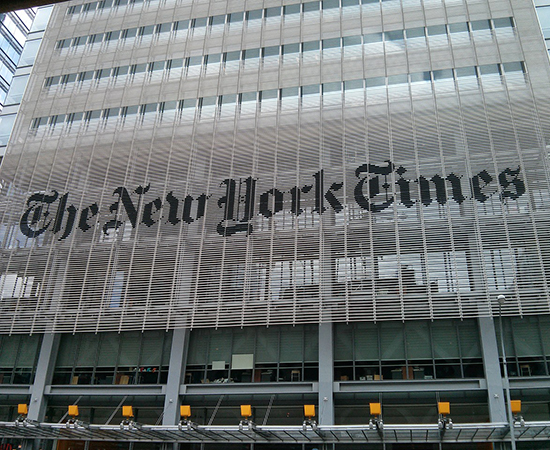Symposium for Presidents and Provosts: Understanding the Moment
A series of conversations led by The New York Times

Discuss thorny issues and gain perspective from colleagues, journalists, and business leaders.
Join journalists and business leaders at The New York Times headquarters for programming and discussion on some of the biggest stories of our time, as well as their impact on higher education. We will invite presidents and provosts to join in the conversation throughout the panels, speaking to their own experiences and areas of expertise. As colleges and news organizations alike face new challenges, together we will explore the moment and share insights on how to innovate for the future, while staying true to a core mission.
Who should participate?
- Presidents and chancellors
- Provosts
How will you benefit?
- Connect with other AASCU leaders who are tackling the challenges of our time
- Engage in deep conversation with journalists and business leaders
- Explore the synergies of journalism, higher education, and democracy
Program Highlights
What does “independent journalism” really mean? A presentation by New York Times leadership exploring the importance of a thriving free press, the urgency of conveying truthful stories to the public, and how these concepts are vital to a democratic society–now, more than ever.
A roundtable with New York Times reporters discussing the biggest issues facing universities today, and the insights and trends they’ve observed reporting on the Education beat this year.
New York Times puzzle writers and editors discuss games as a tool for community building and wellness, and lead a live puzzle solve.
A conversation with the The New York Times Politics desk discussing demographic shifts and the continued impact of young voters on electoral politics. We will deconstruct our coverage of the 2024 election, and discuss higher education’s role in fostering engaged and informed voters.
A discussion of the thorny issues surrounding freedom of expression today, on campuses and beyond. What are the threats being imposed on free speech, and what pressures are being placed on educational institutions to act as arbiters and defenders of this right?
How The New York Times is transforming for a digital age. What may change in the future? And what will never change? Hear from New York Times leadership and reporters on innovative strategies to engage readers, and how these strategies relate to changes and trends in higher education.
Representatives from The New York Times Newsroom discuss efforts to maintain the public’s trust as purveyors of truth and knowledge. What are the issues currently facing journalism and higher education as issues of mis- and disinformation continue to proliferate?
Climate reporters discuss the rising call to action from youth engaged in fighting the climate crisis and what it means for colleges, politics and policymaking, and our nation’s future as a whole.
Schedule at a Glance
| Thursday, March 21, 2024 | |
|---|---|
| 8-8:30 a.m. | Breakfast |
| 8:30 a.m.-12 p.m. | Programming |
| 12-1 p.m | Lunch |
| 1-5:30 p.m. | Programming |
| 5:30-7 p.m. | Reception |
| 7 p.m.- | Dinner on your own |
Meet our speakers

Cara
Buckley
Reporter
The New York Times

Chandra
Cooks
Managing Director, Marketing
The New York Times

David
Halbfinger
Politics Editor
The New York Times

Alex
Hardiman
Chief Product Officer
The New York Times

Anemona
Hartocollis
Reporter
The New York Times

Astead
Herndon
Reporter
The New York Times

Anjali
Huynh
Reporting Fellow, Politics
The New York Times

Ravi
Krovi
Provost and Vice President of Academic Affairs
Weber State University (UT)

Marc
Lacey
Managing Editor
The New York Times

Edmund
Lee
Editor, Trust
The New York Times

Ron
Lieber
Reporter
The New York Times

James T.
Minor
Chancellor
Southern Illinois University Edwardsville

Mel C.
Netzhammer
Former Chancellor
Washington State University Vancouver

Vimal
Patel
Reporter
The New York Times

Ora H.
Pescovitz
President
Oakland University (MI)

Jeremy
Peters
Reporter, National
The New York Times

Patricia Pierce
Ramsey
President
City University of New York, Medgar Evers College

Jennifer
Schuessler
Reporter
The New York Times

Kristy
Schultz
VIce President, Enterprise
The New York Times

Mary
Suh
Editor, Education
The New York Times

LIsa
Tobin
Executive Editor, Newsroom Audio
The New York Times

Susan
Wessling
Standards Editor
The New York Times
Register today to join in the conversation.
- Registration is open to presidents, chancellors, and provosts from AASCU member institutions only
- Capacity is limited to 75 participants
- The registration fee for this symposium is $250; this fee is nonrefundable
- Members are responsible for their travel and accommodations
Accommodations
Members may book their own accommodations. There is no code or AASCU room block. AASCU and The New York Times have provided the below selection of hotels nearby the symposium location for your consideration and convenience.
- Hilton New York Times Square (around the corner from meeting location)
- AC Hotel New York Times Square (around the corner from meeting location)
- Andaz 5th Avenue (Hyatt) (0.6 mile walk from meeting location)
- Ink48 Hotel (one mile walk from meeting location)
- Kimpton Eventi (one mile walk from meeting location)
AASCU is committed to the health, safety and well-being of all attendees at our gatherings. We follow all local rules and CDC guidance and closely monitor conditions related to COVID-19 and other public health emergencies. Attendees at all AASCU events agree to adhere to the following health and safety protocols.
Before leaving home
- AASCU strongly encourages all participants to be fully vaccinated. The CDC Vaccines website provides definitions of “Fully Vaccinated” and “Up To Date”.
- Stay home if you feel unwell or have any COVID-19 symptoms or test positive for COVID-19. We recommend attendees wear masks while traveling to and from the event and follow COVID-19 safety practices in the days leading up to the event.
- We strongly encourage attendees to take a rapid antigen COVID-19 test before traveling and before arriving to AASCU convenings.
Onsite during the event
- Masks are recommended and will be available at the registration desk.
- If you are experiencing cold or COVID-19 symptoms please be respectful and wear a mask.
- Self-administered COVID-19 rapid antigen tests will be available at the registration desk. We encourage participants test themselves upon arrival before joining the conference.
- Wash hands often with soap and water for at least 20 seconds, or use an alcohol-based sanitizer with at least 60% alcohol
- Avoid touching eyes, nose, and mouth with unwashed hands
- Cover your nose and mouth when coughing or sneezing. Throw used tissues in the trash.
- Clean and disinfect frequently touched objects and surfaces using a regular household cleaning spray or wipes.
- If you feel unwell, develop symptoms of COVID-19, or test positive for COVID-19 at any time during the convening, seek medical care and do not attend the meals or gatherings.
- If you test positive during the conference, please notify AASCU staff by emailing meetings@aascu.org.
AASCU reserves the right to modify these policies and procedures at any time given the rapidly changing nature of any current and ongoing public health emergencies.
All meetings and conferences sponsored by AASCU are inclusive and accessible to all individuals, including individuals with disabilities. Please request accessibility services when you register and contact us if you need auxiliary aids or services.
By participating in an AASCU conference, you are automatically authorizing AASCU to use your name, photograph, voice, or another likeness for purposes related to the mission of AASCU, including but not limited to publicity, marketing, websites, social media vehicles, and any other AASCU-related electronic forms or media for the promotion of AASCU and its various programs.
Sorry, we are not accepting inquiries about partnerships for this event at this time. Please visit our Partners page to explore other opportunities to support AASCU programming.
Questions about this symposium? Let us know.
"*" indicates required fields